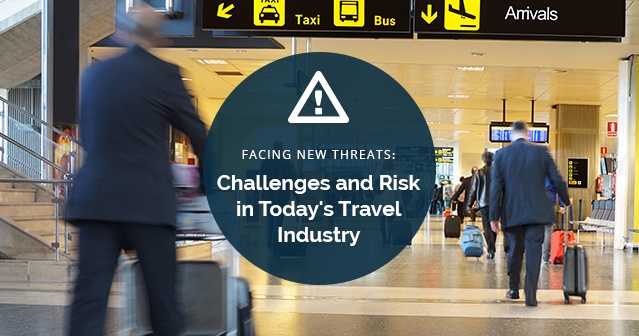Challenges and Risks Facing The Travel and Tourism Industry: Pt 1
Posted by Mike Atherton on 06 September, 2016
Following on from our recent post, this blog marks the second installment of identifying the largest obstacles the global travel industry is likely to encounter.
The impact of terrorism, the sharing economy and the Zika virus on the health of the global travel industry is considerable, and, whilst they all represent a significant threat, they also only account for a cross-section of the challenges being faced by the travel industry today.
Brexit, the world economy and fluctuating oil prices may also prove troublesome for TMCs as travellers cancel or alter travel arrangements in the wake of such concerns. But why are these issues impacting travel, and what are the long-term prospects for travel?
The Effects Of Covid-19
The Brexit-Effect in Travel
The impact of Brexit poses both a significant threat and opportunity to the travel industry. Britain’s proposed exit from the European Union has had far-reaching implications not only within Europe, but across the world. The predominant short-term impact of Brexit has been the falling pound – a weaker currency creates more expensive options for the consumer, and thereby results in an overall reduction in travel. This represents one in a long-line of serious challenges to the travel industry; it creates a necessity to reduce travel costs in order to remain an attractive solution to customers.
The silver lining for TMCs is that travel is a two-way street. Although outbound travel from the UK is set to diminish due to cost, inbound travel to the UK is set to increase for the same reason. London became the most popular city destination for foreign visitors in 2015 with almost 19m tourists visiting the city and the weaker pound has already resulted in travel from the US to the UK being 10% cheaper than it was pre-Brexit.
As with most matters involving Britain’s departure from the EU, the future remains unclear. Nevertheless, Brexit has already increased costs within the UK travel sector. Over time, the UK’s ability to rebuild its relationship with the EU will be a key factor in determining the extent of the impact on the travel industry.
How Does the World Economy Impact Travel?
The travel and tourism industry has grown consecutively for the last six years, and in 2015, it made up almost 10 per cent of global GDP. The sector employs nearly 300 million people – roughly translating as 1 person in every 11 jobs across the planet – yet, being so paramount to the health of the world economy can have its disadvantages.
Due to the importance of the travel industry on world economic stability, the two have become intertwined. A fluctuation in world markets or a fall in global interest rates can create instability for the travel and tourism industry. Experts forecast both negative GDP growth and a fall in global interest rates for 2016, which may yet prove to be a significant challenge for TMCs. The bottom-line impact of economic instability is that maybe leisure customers are less likely to travel, corporate travel will likely decline, and therefore less business is generated for the travel industry as a whole.
However, it must be noted that the inverse of this assertion is also true. As demonstrated above, there is a relationship between a growth (whether positive or negative) in GDP with a growth within the travel and tourism industry. Experts forecast that, despite fluctuating world markets, over time GDP will continue to grow and therefore in the long term, the travel and tourism industry will continue to grow with it.
The fall of oil prices has a similar correlation. The health of oil markets can lead to a ripple effect all throughout the travel industry. On the surface, it appears that lower oil prices mean more road trips for leisure travellers and better airline margins for business travel, but they also translate to dips in corporate travel business for hotels, and this translates to an overall decline in profit margin throughout the travel and tourism sector.
Long-Term Prospects of Travel
It is true that the industry of travel and tourism is experiencing some of the greatest challenges that it will ever face.
The impact of Brexit on travel has been widely documented, however the future of travel to and from the United Kingdom from Europe and beyond remains, at best, speculation. Terrorism has the capacity to be the greatest threat to the travel industry overall – the devastating effects of attacks are mirrored by the collapse in tourism to those affected areas.
Many TMCs are choosing to combat the threat of the sharing economy face-on, embracing the emerging market so as to better compete. Meanwhile global hotel brands have chosen to compete in another way, by challenging OTAs for remaining room bookings. The Zika virus is proving to be a thorn in the side of the travel industry; medical experts are advising not to travel to areas affected with the disease, especially if pregnant, and the reduction in travel has resulted in a number of cancellations and re-bookings, putting strain on many TMCs.
The health of oil markets, variance in global GDP and a fall in interest rates can all spell disaster for the industry, as both corporate and leisure travel is likely to decrease. The one saving grace in this regard is that global economic security is now tied to the success travel and tourism industry. Therefore, in spite of the short-term challenges examined above, the long-term outlook is continued growth throughout the industry and light at the end of the tunnel for TMCs.
These two posts have endeavoured to map-out and examine some of the greatest challenges and risks facing the global travel industry today. The impact of much of this travel risk has already been felt – global economic uncertainty, fluctuating world interest rates and falling oil prices have already resulted in reduced corporate travel. Whereas the full force of Britain's departure from the European Union, the ongoing threats of terrorism and disease, and the continued rise of the sharing economy may still have sever repercussions for the travel and tourism industry.
Click here to download our ebook and discover more invaluable insight into the future of the business travel from industry though-leaders.



